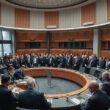The German Environment Minister, Carsten Schneider of the Social Democratic Party (SPD), has voiced concerns over the increasing societal fragmentation surrounding climate action, arguing it is hindering progress and exacerbating political divisions. In an interview with ARD’s “Interview der Woche” Schneider highlighted the polarizing effects of tactics employed by climate activists, such as “glue protests” which he acknowledged have generated significant frustration and anger among the populace. Simultaneously, he criticized the politically extreme right, specifically the Alternative for Germany (AfD), for its condemnation of climate protection policies.
Schneider emphasized the necessity of inclusive climate action, insisting it cannot be viewed as an adversarial issue. “Climate protection cannot be directed “against” people” he stated, expressing his efforts to de-escalate tensions and promote rational discourse. He pointed to the ongoing debate surrounding renewable energy infrastructure as a prime example of artificially manufactured division. While wind turbines and solar farms predominantly reside in rural areas, a perceived chasm has emerged between urban populations often portrayed as progressive and rural communities allegedly resistant to change. Schneider directly attributed the amplification of this narrative to the AfD, accusing the party of leveraging it for political gain.
To bridge this divide, Schneider advocated for tangible benefits for rural communities hosting renewable energy projects, suggesting mechanisms such as revenue sharing or preferential electricity rates. He cautioned against the imposition of “moralizing finger-wagging from Kreuzberg” a clear reference to the perceived urban elite dictating solutions to rural populations.
The Minister also defended the German government’s decision to withhold the specific amount of its contribution to the “Tropical Forest Forever Facility” at the recent UN climate conference in Brazil. This fund, designed to incentivize tropical forest preservation, is backed by both public and private investment. While assuring commitment to the initiative, Schneider explained that Germany’s adherence to budgetary regulations necessitates a precise alignment of any pledge, warranting a detailed evaluation before a formal announcement. He promised a “substantial and noteworthy” contribution, dismissing any impression of a minimal commitment. The rationale offered has drawn criticism, with some observers questioning whether the reluctance to provide transparency about funding reflects a deeper hesitancy within the government concerning ambitious climate commitments.





